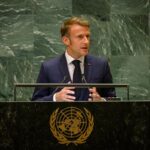On January 2, 2025, Pakistan began its eighth term as a non-permanent member of the United Nations Security Council (UNSC) for the 2025–26 term.
Pakistan will preside over the 15-member Council in July 2025, following the alphabetical rotation of member states’ official names. This Presidency will allow Islamabad to set the Council’s agenda. The UNSC comprises 15 members: five permanent ones—Britain, China, France, Russia, and the United States—and 10 non-permanent members elected based on geographic regions, with five replaced annually.
At the joining ceremony, flags of the five new non-permanent members—Pakistan, Denmark, Greece, Panama, and Somalia—were installed at the UNSC stakeout at the United Nations Headquarters in New York. These nations replaced Japan, Ecuador, Malta, Mozambique, and Switzerland, whose terms ended on December 31, 2024.
Pakistan’s Alternate Permanent Representative, Ambassador Asim Iftikhar Ahmad, raised the national flag during the ceremony, reaffirming Pakistan’s commitment to the UN Charter, particularly the maintenance of international peace and security, and the development of friendly relations based on equality and self-determination.
“Pakistan will always remain a strong voice for peoples under foreign occupation and oppression and for the realization of their right to self-determination,” Ambassador Ahmad said.
He emphasized the importance of addressing the root causes of conflicts, prioritizing dialogue and diplomacy, and fostering confidence-building at regional and global levels. These steps, he said, are crucial for reducing tensions, halting the arms race, and creating an environment conducive to peace and development.
He emphasized that Pakistan firmly believes cooperative multilateralism, with the United Nations at its core, is the most effective approach to addressing today’s complex challenges. He stated that Pakistan would collaborate with fellow members to actively seek just and peaceful resolutions to the issues on the Council’s agenda and would aim to maximize the use of available tools—from conflict prevention to peacekeeping and peacebuilding—to secure lasting peace.
“Our success lies in upholding the UN Charter and international law under all circumstances, and in ensuring effective implementation of the Security Council’s own decisions,” added Ambassador Ahmad highlighting Pakistan’s unwavering commitment to its solemn duty towards the millions of men, women, and children affected by conflicts.
“Pakistan is assuming this responsibility, fully resolved to our collective endeavor for a more peaceful and secure world,” he emphasized.
Pakistan’s Presidency will include a seat on the Islamic State (ISIS) and Al Qaeda Sanctions Committee, responsible for classifying individuals and groups as terrorists and imposing sanctions.
The flag installation ceremony tradition was introduced by Kazakhstan in 2018. At this year’s ceremony, Kazakhstan’s Permanent Representative, Kairat Umarov, expressed confidence in the incoming members’ ability to address global peace and security challenges.
“As we begin a new year, it is clear that the global situation continues to be marked by numerous challenges and crisis, from ongoing conflicts and humanitarian calamities to the negative impacts of climate change and the pandemic,” noted Ambassador Umarov.






